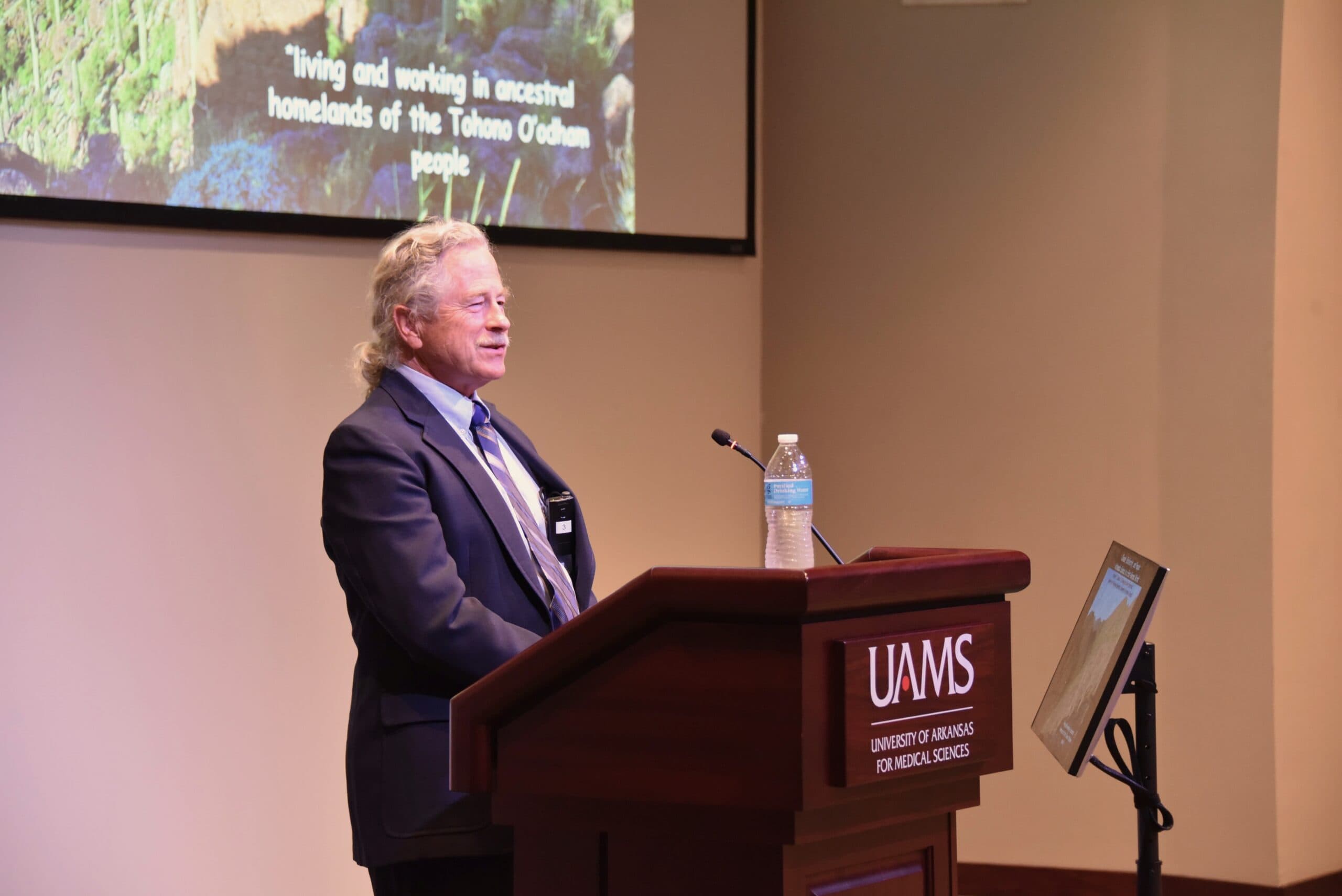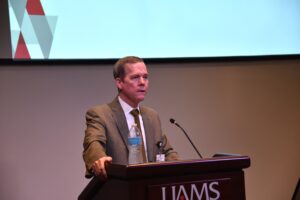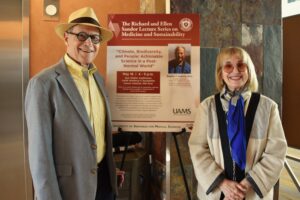View Larger Image

Stephen T. Jackson, Ph.D., is the second speaker in the Richard and Ellen Sandor Lecture Series on Medicine and Sustainability.
Image by Andrew Vogler
Stephen Jackson, Ph.D., Speaks about Climate Change Research in Second Sandor Lecture
| Stephen T. Jackson, Ph.D., scientist emeritus at the U.S. Geological Survey (USGS) and professor emeritus of botany at the University of Wyoming, discussed climate change research at the University of Arkansas for Medical Sciences’ (UAMS) second annual Richard and Ellen Sandor Lecture Series on Medicine and Sustainability.
The lecture, held May 16 in the Sam Walton Auditorium in the UAMS Winthrop P. Rockefeller Cancer Institute, is made possible through a gift by Richard L. Sandor, Ph.D., and Ellen Sandor.
Cam Patterson, M.D., MBA, UAMS chancellor and CEO of UAMS Health, welcomed guests and introduced Jackson.
“I would like to welcome everyone to the second lecture in the Richard and Ellen Sandor Lecture Series on Medicine and Sustainability, and we are thrilled to have Dr. Stephen Jackson speaking to us today,” said Patterson. “Before we continue, I would like to thank Richard and Ellen Sandor for their generous gift to UAMS that made this series possible. The Sandors have a special place in the hearts to many at UAMS, not only for their generosity but for their support for many areas of our institution.”

Cam Patterson, M.D., MBA, UAMS chancellor and CEO of UAMS Health, introduced Stephen T. Jackson, Ph.D.
The lecture, titled “Climate, Biodiversity and People: Actionable Science in a Post-Normal World,” detailed Jackson’s extensive research, focusing on the past 25,000 years of Earth’s history as a source of natural experiments to explore ecological responses to environmental changes. Jackson’s lecture explored how climate has affected industries such as health care and public health, and the challenges that organizations like UAMS are facing. Jackson concluded his lecture by discussing possible paths of action humanity could take in adapting to a “post-normal” world.
“I really appreciate the invitation to come to UAMS and speak. Though you aren’t my direct colleagues, I’ve spent my entire career crossing disciplinary boundaries, and the more of it I do, the more rewarding and insightful it gets. Some of my most important contributions have been inspired by other disciplines and this includes the medical sciences,” said Jackson. “I see this lecture as a way of paying back, and hopefully it will provide you with some insights in the scientific areas that I have been working in, and I hope it will be useful to you in your professional and personal lives.”
In his many positions, which include senior science advisor on biodiversity for the USGS National Climate Adaptation Science Center and director of the Department of the Interior Southwest and South Central Climate Adaptation Science Centers, Jackson has worked to foster effective engagement between researchers and natural-resource decision-makers.
In the past two decades, Jackson’s professional efforts have expanded to include natural-resource conservation and climate-change adaptation. His interests also include the history of science, and he has edited two English translations of classic works by Alexander von Humboldt, with a third translation nearing completion.
“This has been a fantastic presentation and looking at this through the lens of health care, it is clear that climate change is going to have a human impact, and Jackson’s lecture details how complicated that will be,” said Patterson. “We could not have asked for a better presentation for this lecture series, and I want to thank Dr. Jackson for taking the time to speak to members of our institution.”
Both Richard and Ellen Sandor attended the event.

The lecture series is made possible through a gift by Richard L. Sandor, Ph.D., and Ellen Sandor.Andrew Vogler
Richard Sandor, a businessperson, economist and entrepreneur, is chair and CEO of Environmental Financial Products and Chairman Emeritus of the American Financial Exchange. He is the Aaron Director Lecturer in Law and Economics at the University of Chicago Law School and an honorary professor at the University of Hong Kong and Fudan University. In 2002, Time magazine named Sandor as “Hero of the Planet” for his work as the founder of the Chicago Climate Exchange, and in 2007, it honored him as one of the “Heroes of the Environment” for his work as in carbon trading.
Ellen Sandor is a new media artist and founding director of (art)n, with works in the permanent collection of the Smithsonian Institution, International Center of Photography and Santa Barbara Museum of Art. In 2014, she received an honorary doctorate from the School of the Art Institute of Chicago and was the 2016 artist in residence at Fermilab. Sandor is a board member at American Friends Musées d’Orsay et de l’Orangerie and is a life trustee emeritus of the Art Institute of Chicago.
“It was a great pleasure listening to Dr. Stephen Jackson discuss his research, but also learning about his years of experience at the forefront of climate science,” said Richard Sandor.
We are extremely grateful that he was able to visit UAMS and share his knowledge with us,” added Ellen Sandor.
Jackson’s lecture can be viewed here.